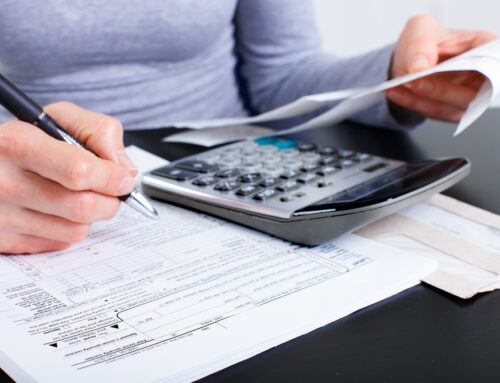Small business owners have many tasks to juggle, and one of them is filing small business taxes. So, where do you start? How do you know you’re filing taxes correctly? What tax deductions can you take? Do you have all the documents and records you need?
Small businesses pay taxes at the federal, state, local, and municipal levels, and improperly filing those tax returns can be an expensive mistake. So how do you correctly file small business taxes? Most established business owners prefer to hire a Certified Public Accountant (CPA) to do these filings because of the volume and complexity. In the initial year of operations, however, many small business owners decide to file these tax returns themselves.
If you endeavor to file small business taxes on your own, here are some things to consider.
How to estimate quarterly taxes for small business
Small business owners should set aside some of their net earnings each quarter to pay their business taxes. Estimating how much to set aside can be a challenge, and will affect the cash flow of your business, so it’s important to arrive at a good estimate. To estimate federal quarterly tax liabilities, review your earnings in each quarter. Subtract your expenses for that quarter. The remaining balance is what will be taxed … income tax as well as self-employment tax. Businesses are required to pay their federal estimated tax liability to the IRS each quarter, and can make that payment very easily from the IRS.gov website. Select “Make a Payment”. You’re paying an estimate, not an exact amount. The exact amount of tax will be determined at the time you file your annual business tax return at which time you’ll find out if you’ve over or under paid.
Remember that if you’re selling ‘widgets’, you’ll most likely owe state sales taxes that should be paid monthly or quarterly depending upon the amount of your sales. If you’re doing business inside a city business district (CBD) then you may also pay a monthly or quarterly CBD tax for the privilege of doing business inside that district. If you lease an AirBNB then you may be required to file a transient tax monthly or quarterly. Many states (and some local) now require filings and payments to be submitted electronically from the state’s website.
How much do small businesses pay in taxes?
First, keep in mind that there are three different tax categories: federal, state, and local taxes. Your small business tax rate for each depends on many factors, like how much net income is earned, the number of employees, the type of business, which states you operate in, if you sell services or widgets, the value of your business’s land, buildings, and more.
It’s not all about tax liabilities, however. Your business may also qualify for tax credits and deductions, depending on the type of business, land, and goods sold. To determine everything you need to file and what you may deduct, the IRS website provides plenty of resources for federal taxes and state and local taxes.
Be sure to use the correct form when filing your business taxes. At the federal level there’s Schedule C on Form 1040 to report profits and losses as a sole proprietor; Form 1120 or 1120S to report income, gains, losses, deductions, and credits as a corporation or an S-corporation respectively; and Form 1065 to report business income, expenses and losses as a partnership. These are just a few forms used when filing at the federal level. Your business may also need to file information returns using Form 1095-B&C, Form 1099 and others. TN state filings are all required to be completed, submitted and paid using business portals such as TNBear and TNTAP.
Once you have your documents together, it is vital to know when to file them. State (and some local) filing deadlines become more frequent as a business grows in revenue, so be aware of all these deadlines.
Some business taxes include:
- Income tax
- Self-employment tax (for individuals who work for themselves, i.e., freelance and gig workers)
- Employment taxes (for businesses with employees)
- Excise tax (taxes imposed on goods, services, and activities like petroleum, certain chemicals, coal, kerosene, sports wagering, indoor tanning, motor fuel, and more)
- Sales tax
- Transient taxes (for hotels and, in some states, short-term rentals)
- Property & Personal Property tax
- Business Registration tax
Small business tax credits, tax exemptions and tax deductions
In addition to owing taxes, you may earn tax credits if your business benefits the disadvantaged, incorporates green initiatives, invests in qualified business activities, or hires a specific class of individual, i.e. hiring veteran workers.
You’re in luck if you are a wholesale manufacturer! Wholesalers are businesses that do not sell to the public, but rather sell products they have manufactured or acquired to other businesses who then sell the products to their customers. Wholesale manufacturers can register for a tax exempt certificate to use when purchasing inventory for their manufacturing activities.
Are you a farmer? Apply for an agricultural sales and use tax exemption certificate! Using this certificate will allow you to purchase specified farming equipment and supplies tax exempt.
Retailers sell products to customers and may also apply for a resale exemption certificate to get tax exempt treatment when purchasing products they intend to resell to customers.
What about those deductible expenses? Business expenses are either tax deductible or depreciable at the federal level. If you keep track of costs, you can file them as deductions.
Some business expenses include:
- Payroll and contract labor costs
- Cost of goods sold by the business
- General administrative costs, i.e. rent, utilities, office supplies, accounting services, etc.
- Business mileage or vehicle(s) costs
- Business travel and travel meal costs
- Home office costs
- Start-up costs
- Professional fees and training costs
- Equipment and software purchases
- Moving costs
It’s important to understand that some items may be deductible at the federal level, but they are taxed at the local level. Examples include equipment, inventory, supplies, property improvements and real property. These items are known as business property and business personal property.

Business property tax and personal property tax
There are two types of local property taxes: business property tax and business personal property tax.
Do businesses pay property tax?
Depending on which state you live in, you may need to pay taxes on both of these.
Business property tax
Businesses owners are responsible for paying a business property tax in the same manner that homeowners in the community pay property taxes. This is a tax on real property, like land and structures. Taxable business property includes anything permanently attached to a physical location, like your building, land, electrical, plumbing, etc. The value of the land or real estate determines the tax rate a small business owner pays.
Business personal property tax
In addition to business property tax, businesses may have to pay a business personal property tax, which includes any item not fixed to the physical property such as equipment, electronic devices, furniture, supplies, leased equipment, and movable machinery including vehicles used for business purposes. These items are sometimes referred to as tangible personal property. Sales tax on business supplies and equipment is assessed at the time of purchase and then an annual value tax is assessed on the depreciated value of the business personal property.
While local municipalities require tax on business personal property, the IRS treats these items as either deductible business expenses or depreciable business assets. So, even though you may pay local taxes on certain items, those same items can be deductible for federal taxes. To see what tax deductions your small business in Tennessee qualifies for, reach out to your local CPA.
Property tax exemption
Some businesses qualify for a property tax exemption. For example, property owned by a religious, charitable, scientific, or non-profit educational institution may qualify for business property tax exemption. However, the exemption depends on whether the property is used regularly for the entity’s exempt purpose and does not make a profit for any of its owners, members, etc. For example, a Biblically themed amusement park cannot claim to be a religious organization for tax exemption since they would make a profit on items like ticket sales.
How to avoid tax consequences
While tax deductions and credits are great, some business owners run afoul of the regulations. Business owners that file returns and/or pay their taxes late can expect to receive notices from the IRS and state taxing authorities notifying them that penalties and interest have been assessed against their businesses. You can avoid this consequence by staying on top of your filings and payments. If you’re a not-for-profit, you can lose your tax exempt status if filings are not maintained in a timely manner.
Detailed tax planning can help you minimize additional tax obligations from large transactions, windfalls, and significant gains. There are a variety of legal strategies that can be used to reduce a tax obligation including deferring the current year’s income by contributing to a traditional retirement account, setting up a trust or a separate LLC, making an S-Corp election, donating appreciated stock or cash to a charitable organization (there are multiple ways to use donations to your advantage), and many others! But be careful! Improperly filing significant transactions can result in tax fraud. Again, a trusted CPA can advise you on what to do with that money and how to file to save money to lower the amount of tax you owe each year.
Tax avoidance vs. tax evasion
While tax avoidance is entirely legal and a smart way to save money, tax evasion is a federal crime. Tax evasion includes both illegal non-payment as well as illegal underpayment.
The IRS can determine if more taxes were owed than the payment they received by cross referencing third party tax information. If the IRS can prove deliberate and willful non-payment or underpayment, you can be charged with tax evasion, serve jail time, and owe a fine. So, don’t leave tax avoidance to chance—consult a CPA for the best financial move.
How to stay current with changing tax laws
What’s up in 2023? You may be wondering about new tax laws like Venmo and Cash App tax laws on top of other typical law changes. Furthermore, years with shifts in the political landscape, like an election season, usually come with tax law changes.
For reference, the U.S. tax code is 9,000 pages and saw 4,600 changes between 2001-2012. Keeping up with the ever-changing and often hard-to-interpret laws is nearly impossible for anyone other than a tax professional. However, if you endeavor to keep up with the laws, you can subscribe to local business journals, read national financial publications, and sign up for the IRS newsletter. Be sure you keep up with changes in state, local, and federal tax laws.
How to file small business taxes in 2023
With so many variables, filing small business taxes can be time-consuming. It can also be tricky to know what qualifies as a business expense or as a personal expense when you own a small business. You may also be unsure if you are filing your taxes correctly or paying too much in taxes. If you’re worried about filing taxes for your small business, hiring a local CPA may be your best choice.
Our experienced team at TriStar CPAs can help you estimate your quarterly tax liability, identify strategies to reduce tax obligations, assess tax consequences, navigate changing tax laws, and more. We can help you prepare federal, state, and local tax returns for your small business entity. That’s what we do! Receive the best tax preparation service in middle Tennessee with a professional at TriStar CPAs.






Leave A Comment